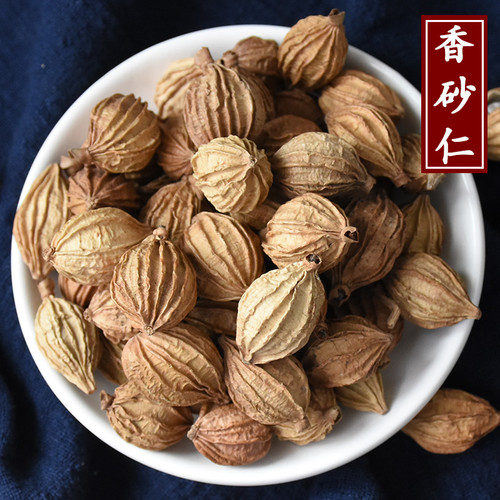Product Overview
Parts used: Dried ripe fruit
TCM category: Aromatic herbs that transform Dampness
TCM nature: Warm
TCM taste(s): Pungent
Meridian affinity: Spleen Stomach Kidney
Scientific name: Amomum villosum
Other names: Black Cardamom, Villous amomum
Use of amomum fruits (Sha Ren) in TCM
Please note that you should never self-prescribe TCM ingredients. A TCM ingredient is almost never eaten on its own but as part of a formula containing several ingredients that act together. Please consult a professional TCM practitionner, they will be best able to guide you.
Preparation: Remove impurities
Dosage: 3-6g
Main actions according to TCM*: Warms the Spleen and transforms Dampness. Promotes the movement of Qi for Damp and Stagnant conditions of the Stomach and Spleen. Settles a restless fetus and stops morning sickness. Prevents cloying and Stagnation sometimes caused by tonifying herbs.
Primary conditions or symptoms for which amomum fruits may be prescribed by TCM doctors*: Dysentery Abdominal pain Vomiting Diarrhea Anorexia Miscarriage Dysphagia Morning sickness
Contraindications*: This herb should not be used by those with Yin Deficiency when there are Heat signs.
Common TCM formulas in which amomum fruits are used*:
For bloating, nausea and vomiting caused by blocked Qi of the Spleen and Stomach combine amomum fruits with houpu magnolia bark (Hou Pu) and tangerine peel (Chen Pi).
For infantile vomiting combine amomum fruits with liquorice (Gan Cao).
For Cold Stomach and Spleen with abdominal pain, diarrhea and lack of appetite combine amomum fruits with cloves (Ding Xiang), atractylodes rhizomes (Bai Shu) and dried ginger (Gan Jiang).
For morning sickness combine amomum fruits with korean mint (Huo Xiang) and fresh ginger (Sheng Jiang).
For relieving the symptoms of morning sickness and preventing miscarriage combine amomum fruits with perilla leaves (Zi Su Ye) and tangerine peel (Chen Pi).
For dysuria, scanty urine and fullness in the abdomen combine amomum fruits with water plantain (Ze Xie).
Key TCM concepts behind amomum fruits (Sha Ren)'s properties
In Traditional Chinese Medicine (TCM), amomum fruits are plants that belong to the 'Aromatic herbs that transform Dampness' category. This category of herbs resolves a TCM condition called 'Cold Damp Stagnation', especially as it affects the Stomach and Spleen. In modern medicine this often translates into symptoms such as distended chest and abdomen, lack of appetite, nausea and vomiting
As suggested by its category amomum fruits are plants that are Warm in nature. This means that amomum fruits tend to help people who have too much "cold" in their body, although with less effect than a plant that would be Hot in nature. Balance between Yin and Yang is a key health concept in TCM. Those who have too much cold in their body are said to either have a Yin excess (because Yin is Cold in nature) or a Yang deficiency (Yang is Hot in Nature). Depending on your condition amomum fruits can help restore a harmonious balance between Yin and Yang.
Amomum fruits also taste Pungent. The so-called "five elements" theory in Chinese Medicine states that the taste of TCM ingredients is a key determinant of their action in the body. Pungent ingredients like amomum fruits tend to promote the circulations of Qi and body fluids. That's why for instance someone tends to sweat a lot when they eat spicy/pungent food.
The tastes of ingredients in TCM also determine what organs and meridians they target. As such amomum fruits are thought to target the Spleen, the Stomach and the Kidney. In TCM the Spleen assists with digestion, blood coagulation and fluid metabolism in the body. The Stomach on the other hand is responsible for receiving and ripening ingested food and fluids. It is also tasked with descending the digested elements downwards to the Small Intestine. The Kidneys do not only regulate the urinary system but also play a key role in the reproductive system and the growth and aging process of the body.
Use of amomum fruits (Sha Ren) as food
Amomum fruits are also eaten as food.







